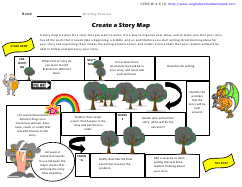Writing Process Worksheets To Print:
Report Checklist - All the things that you need to do to write a solid report on a book or other body of work.
Your Report: Final Steps - A simplified version of the previous. Use the checklist below and the editing symbol chart your teacher gives you to help make improvements in your first draft.
Create a Story Map - A story map is a plan for a story that you want to write. It is a way to organize your ideas, and to make sure that your story has all the parts that it needs (like a beginning, a middle, and an end!) before you start writing. Brainstorming ideas for your story and organizing them makes the writing process easier, and makes it more likely that your readers will both be able to follow and will enjoy your story.
The Guitar - Find all 30 mistakes in this one. A little proofreading, but a lot of editing. The first one has been corrected. Find the rest and use editing marks to correct each one.
Knock it out of the Park! - This is a really neat way to organize your thoughts. Just like making a great play in an important game, writing a good report requires preparation, and a firm understanding of the rules of the game. Do a great job on your next report by following these simple steps.
The Writer at Work - Do you have an idea for a great story? Starting with an idea and brainstorming can be a great way to work out the details, and organizing all of your ideas can make the writing process easier. Use this template to help you organize the writing of a story.
Revising for Impact - Follow the prompts to revise each sentence so that it will have more impact for the reader.
The Revision Pyramid - Reviewing your own work is difficult at first. This is a core part of developing as a writer. On each line the base sentence, follow the directions to make the sentence more interesting and specific.
Revision Checklist - A reminder on how to edit your own work.
The Editor's Role - An editor does more than just correct mistakes; he or she can help to shape a manuscript by moving things around, and for suggesting ways to revise or develop it.
Kelly's Kitten - Part of revising your writing is to look and see where it can use more development.
Revising For Style - Style in writing means the way in which an author chooses to write, what words she uses, what tone she takes, etc.
Revising Your Writing - Take a story that you have written. Use the questions to determine what needs to be revised.
Mr. Miller - Mr. Miller bought a horse and everything changed. On each line below the base sentence, follow the directions to make the sentence more interesting and specific.
Writing With Purpose - When your research is completed, organizing your ideas before you start writing will make the writing process easier.
Get FREE English Worksheets In Your Email

